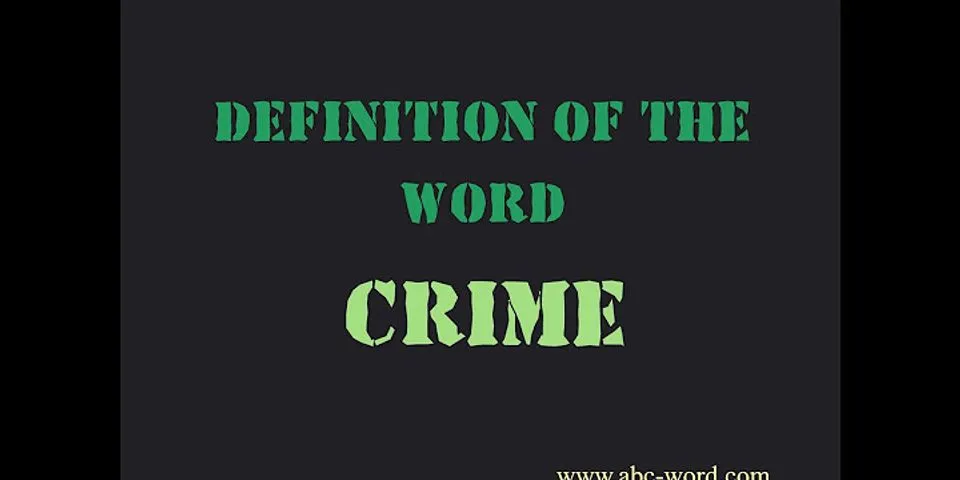The Functionalist analysis of crime starts with society as a whole. It seeks to explain crime by looking at the nature of society, rather than at individuals. There are two main thinkers usually associated with the Functionalist Perspective on Crime: Emile Durkheim and Robert Merton. Show
The Functionalist Perspective on Cr... Please enable JavaScript The Functionalist Perspective on Crime and DevianceThis post provides a summary of Durkheim’s Functionalist Theory of why crime is inevitable and functional for society. Another related Functionalist who theorised about crime was Robert Merton who developed the Strain Theory of Crime.   Durkheim: Three Key Ideas About CrimeThere are three main aspects to Durkheim’s theory of crime:
Durkheim developed his theory of crime and deviance in The Rules of Sociological Method, first published in 1895. Crime is InevitableDurkheim argued that crime is an inevitable and normal aspect of social life. He pointed out that crime is inevitable in all societies, and that the crime rate was in fact higher in more advanced, industrial societies. Durkheim theorised crime was inevitable because not every member of society can be equally committed to the collective sentiments (the shared values and moral beliefs of society). Since individuals are exposed to different influences and circumstances, it was ‘impossible for them to be all alike’ and hence some people would inevitably break the law. Durkheim also theorised that deviance would still exist even in a ‘society of saints’ populated by ‘perfect’ individuals. The general standards of behaviour would be so high that the slightest slip would be regarded as a serious offence. Thus the individual who simply showed bad taste, or was merely impolite, would attract strong disapproval. Durkheim also argued deviance was necessary for social change to occur because all social change began with some form of deviance. In order for changes to occur, yesterday’s deviance becomes today’s norm. Crime Performs Positive FunctionsDurkheim went a step further and argued that a certain amount of crime was functional for society. He argued that crime performed THREE positive functions for societies…
Social RegulationCrime performs the function of social regulation by reaffirming the boundaries of acceptable behaviour. When a crime occurs and and individuals are punished it becomes clear to the rest of society that the particular action concerned is unacceptable. In contemporary society newspapers also help to perform the publicity function, with their often-lurid accounts of criminal acts. In effect, the courts and the media are ‘broadcasting’ the boundaries of acceptable behaviour, warning others not to breach the walls of the law (and therefore society) Social IntegrationA second function of crime is to strengthen social cohesion. For example, when particularly horrific crimes have been committed the whole community joins together in outrage and the sense of belonging to a community is therefore strengthened. Social ChangeA further action performed by the criminals is to provide a constant test of the boundaries of permitted action. When the law is clearly out of step with the feelings and values of the majority, legal reform is necessary. Criminals therefore, perform a crucial service in helping the law to reflect the wishes of the population and legitimising social change.  Too much Crime is DysfunctionalDurkheim argued that crime only became dysfunctional when there was too much or too little of it – too much and social order would break down, too little and there would not be sufficient capacity for positive social change. One of the main problems with this aspect of Durkheim’s theory is that he did not specify precisely how much crime a society needed, or what types of crime! Durkheim’s view of punishmentDurkheim suggested that the function of punishment was not to remove crime from society altogether, because society ‘needed’ crime. The point of punishment was to control crime and to maintain the collective sentiments. In Durkheim’s own words punishment ‘serves to heal the wounds done to the collective sentiments’. According to Durkheim a healthy society requires BOTH crime and punishment to be in balance and to be able to change. How does the sociological perspective view deviance in society?French sociologist Émile Durkheim viewed deviance as an inevitable part of how society functions. He argued that deviance is a basis for change and innovation, and it is also a way of defining or clarifying important social norms. Reasons for deviance vary, and different explanations have been proposed.
What sociological perspective approaches deviance?While there are many different sociological theories about crime, there are four primary perspectives about deviance: Structural Functionalism, Social Strain Typology, Conflict Theory, and Labeling Theory.
What is the functionalist view of deviance?Functionalism claims that deviance help to create social stability by presenting explanations of non-normative and normative behaviors.
Which sociological perspective views deviance as a natural part of society and social function quizlet?functionalist perspective on deviance; Robert K. Merton; views deviance as the natural outgrowth of the values, norms, and strcture of society.
|



















